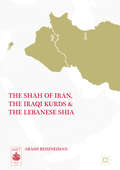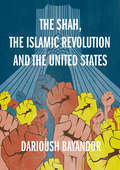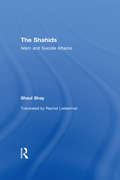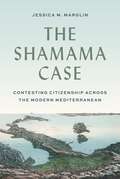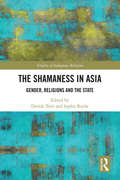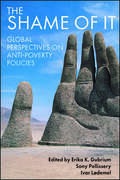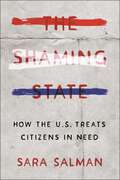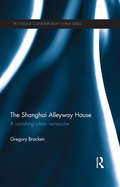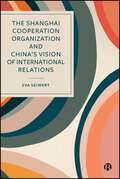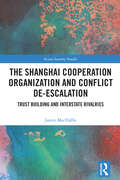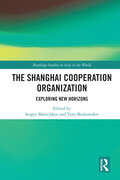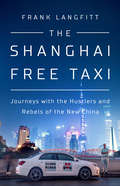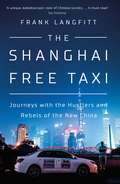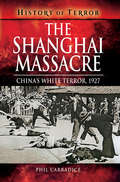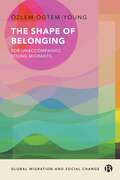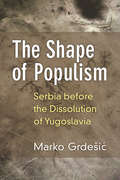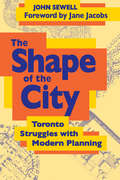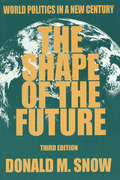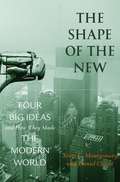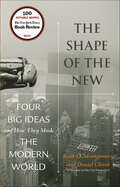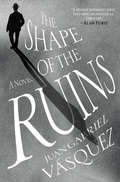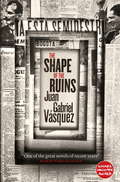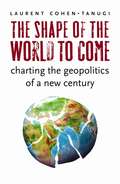- Table View
- List View
The Shah of Iran, the Iraqi Kurds, and the Lebanese Shia (Middle East Today)
by Arash ReisinezhadThis book sheds new light on the emergence and fluctuation of Iran’s connections with non-state entities in the Middle East. Iran’s involvement with political-militant non-states has been at the heart of international and regional security policy for more than three decades. The author analyzes Iran’s non-state foreign policy by focusing on specific geopolitical and geocultural threats and opportunities that pushed Tehran to build strategic ties with the Iraqi Kurds and the Lebanese Shia. This project will appeal to multiple audiences interested in geopolitics of the Middle East, Iran's foreign policy, and international relations.
The Shah's Last Ride: The True Story of the Emperor's Dreams and Illusions, Exile and Death at the Hands of His Foes and Friends
by William ShawcrossBiography of the last few years of the Shah's reign.
The Shah, the Islamic Revolution and the United States
by Darioush BayandorThe Islamic Revolution in 1979 transformed Iranian society and reshaped the political landscape of the Middle East. Four decades later, Darioush Bayandor draws upon heretofore untapped archival evidence to reexamine the complex domestic and international dynamics that led to the Revolution. Beginning with the socioeconomic transformation of the 1960s, this book follows the Shah’s rule through the 1970s, tracing the emergence of opposition movements, the Shah’s blunders and miscalculations, the influence of the post-Vietnam zeitgeist and the role of the Carter administration. The Shah, the Islamic Revolution and the United States offers new revelations about how Iran was thrown into chaos and an ailing ruler lost control, with consequences that still reverberate today.
The Shahids: Islam and Suicide Attacks
by Shaul Shay"Suicide terror has become a fundamental strategic weapon in the confrontation between Fundamentalist Islam and its adversaries and now constitutes a threat to world welfare and security. The Shahids proposes that the nature of this terror changed after the attacks on the World Trade Center on September 11. In this first book to be published on the subject, the author offers both an interpretation and an overall picture of a worldwide phenomenon that is not yet fully recognized, even in Israel, which remains a central arena for the perpetration of suicide attacks by terror organizations.The Shahids analyzes the general phenomenon of Islamic suicide attacks, and provides the reader with tools, comparative analyses, and comprehensive information enabling enlightened examination about suicide attacks worldwide. After a review of the historical development of the religious and ideological values legitimating suicide attacks, the volume explores the ways in which all terror organizations are both alike and different. It focuses on the countries that support terror--Iraq, Iran, and Saudi Arabia--discusses suicide attacks perpetrated by women and the suicide attackers' mothers, and shows how various countries have put an end to suicide attacks. It scrutinizes testimony drawn from confiscated documents regarding the approach of terror leaders and the administrative support of various organizations for suicide attacks, while offering descriptions and direction on ways to contend with this challenge. It explores the possibilities and recommendations for an international struggle against suicide attacks through the implementation of recently published, innovative ideas proposed by UN Organizations, Amnesty International, and Human Rights Watch.The Shahids maps out the overall phenomenon of suicide attacks, as well as identifies various organizations and central key figures through comparative cross-sections."
The Shamama Case: Contesting Citizenship across the Modern Mediterranean
by Jessica MarglinHow a nineteenth-century lawsuit over the estate of a wealthy Tunisian Jew shines new light on the history of belongingIn the winter of 1873, Nissim Shamama, a wealthy Jew from Tunisia, died suddenly in his palazzo in Livorno, Italy. His passing initiated a fierce lawsuit over his large estate. Before Shamama's riches could be disbursed among his aspiring heirs, Italian courts had to decide which law to apply to his estate—a matter that depended on his nationality. Was he an Italian citizen? A subject of the Bey of Tunis? Had he become stateless? Or was his Jewishness also his nationality? Tracing a decade-long legal battle involving Jews, Muslims, and Christians from both sides of the Mediterranean, The Shamama Case offers a riveting history of citizenship across regional, cultural, and political borders.On its face, the crux of the lawsuit seemed simple: To which state did Shamama belong when he died? But the case produced hundreds of pages in legal briefs and thousands of dollars in lawyers&’ fees before the man's estate could be distributed among his quarrelsome heirs. Jessica Marglin follows the unfolding of events, from Shamama's rise to power in Tunis and his self-imposed exile in France, to his untimely death in Livorno and the clashing visions of nationality advanced during the lawsuit. Marglin brings to life a Dickensian array of individuals involved in the case: family members who hoped to inherit the estate; Tunisian government officials; an Algerian Jewish fixer; rabbis in Palestine, Tunisia, and Livorno; and some of Italy&’s most famous legal minds.Drawing from a wealth of correspondence, legal briefs, rabbinic opinions, and court rulings, The Shamama Case reimagines how we think about Jews, the Mediterranean, and belonging in the nineteenth century.
The Shamaness in Asia: Gender, Religion and the State (Vitality of Indigenous Religions)
by Davide Torri; Sophie RocheThis book concentrates on female shamanisms in Asia and their relationship with the state and other religions, offering a perspective on gender and shamanism that has often been neglected in previous accounts. An international range of contributors cover a broad geographical scope, ranging from Siberia to South Asia, and Iran to Japan. Several key themes are considered, including the role of bureaucratic established religions in integrating, challenging and fighting shamanic practices, the position of women within shamaniccomplexes, and perceptions of the body,. Beginning with a chapter that places the shamaness at the centre of the discussion, chapters then approach these issues in a variety of ways, from historically informed accounts, to presenting the findings of extensive ethnographic research by the authors themselves. Offering an important counterbalance to male dominated accounts of shamanism, this book will be of great interest to scholars of Indigenous Peoples across Religious Studies, Anthropology, Asian Studies, and Gender Studies.
The Shame of It: Global Perspectives on Anti-Poverty Policies
by Erika K. Gubrium ; Sony Pellissery ; Ivar LødemelThe shame experienced by people living in poverty has long been recognised. Nobel laureate and economist, Amartya Sen, has described shame as the irreducible core of poverty. However, little attention has been paid to the implications of this connection in the making and implementation of anti-poverty policies. This important volume rectifies this critical omission and demonstrates the need to take account of the psychological consequences of poverty for policy to be effective. Drawing on pioneering empirical research in countries as diverse as Britain, Uganda, Norway, Pakistan, India, South Korea and China, it outlines core principles that can aid policy makers in policy development. In so doing, it provides the foundation for a shift in policy learning on a global scale and bridges the traditional distinctions between North and South, and high-, middle- and low-income countries. This will help students, academics and policy makers better understand the reasons for the varying effectiveness of anti-poverty policies.
The Shaming State: How the U.S. Treats Citizens in Need
by Sara SalmanWINNER, 2024 Jock Young Criminological Imagination Book Award, given by the Division on Critical Criminology & Social Justice of American Society of CriminologyA riveting indictment of a government that fails to help citizens in need of aid, protection, andhumanityThe Shaming State argues that Americans have been abandoned by a government that has relinquished its duties of care toward its citizens. Sara Salman describes a government that withholds care in times of need and instead shames the very citizens it claims to serve, both poor and middle class. She argues that the state does so by emphasizing personal responsibility, thus tacitly blaming the needy for relying on state programs. This blame is pervasive in the American cultural imagination, existing in political discourse and internalized by Americans. This book explores how shaming is exhibited by state and political institutions by showing the ways in which the state withholds care, and how people who need that care are humiliated for failing to be self-sufficient.The Shaming State investigates the vanishing horizon of social rights in the United States and the dwindling of government support to both lower- and middle-class people. Focusing on Iraqi refugees and white home-owning New Yorkers, Salman demonstrates how both groups were faced with immense difficulty and humiliation when searching for access to assistance programs maintained by the government. Looking at the long-range trends, she argues that the last forty years have made the United States a market fundamentalist country, where the government does not offer unified aid and increasingly asks citizens to assume personal responsibility in the face of uncontrollable disasters. Whether it was Hurricane Katrina almost two decades ago or the ongoing COVID-19 pandemic, the indifferent and stagnant response by the American government not only amplified the consequences of these disasters but also increased hostility towards the vulnerable groups who needed help. Ultimately, The Shaming State tells stories of abandonment, loss, shame, and rage experienced by Americans and how the government has let them down time and time again.
The Shanghai Alleyway House: A Vanishing Urban Vernacular (Routledge Contemporary China Series)
by Gregory BrackenAs a nineteenth-century commercial development, the alleyway house was a hybrid of the traditional Chinese courtyard house and the Western terraced one. Unique to Shanghai, the alleyway house was a space where the blurring of the boundaries of public and private life created a vibrant social community. In recent years however, the city’s rapid redevelopment has meant that the alleyway house is being destroyed, and this book seeks to understand it in terms of the lifestyle it engendered for those who called it home, whilst also looking to the future of the alleyway house. Based on groundwork research, this book examines the Shanghai alleyway house in light of the complex history of the city, especially during the colonial era. It also explores the history of urban form (and governance) in China in order to question how the Eastern and Western traditions combined in Shanghai to produce a unique and dynamic housing typology. Construction techniques and different alleyway house sub-genres are also examined, as is the way of life they engendered, including some of the side-effects of alleyway house life, such as the literature it inspired, both foreign and local, as well as the portrayal of life in the laneways as seen in films set in the city. The book ends by posing the question: what next for the alleyway house? Does it even have a future, and if so, what lies ahead for this rapidly vanishing typology? This interdisciplinary book will be welcomed by students and scholars of Chinese studies, architecture and urban development, as well as history and literature.
The Shanghai Cooperation Organization and China’s Vision of International Relations
by Eva SeiwertThe Shanghai Cooperation Organization (SCO) is the first and most established regional organization initiated by China. This book investigates China’s use of the SCO to shape global norms and argues that self-created regional organizations constitute ideal platforms for emerging powers to promote their normative views internationally. Based on original Chinese-language documents and interviews, the book illustrates how China has used the SCO as a regional platform that both represents and promotes China’s core normative views and concepts internationally. The analysis offers crucial insights into the Chinese government’s ambitions for norms and rules of contemporary international relations.
The Shanghai Cooperation Organization and Conflict De-escalation: Trust Building and Interstate Rivalries (Asian Security Studies)
by James MacHaffieThis book’s main objective is to determine the role, if any, the Shanghai Cooperation Organization (SCO) plays in de-escalating tensions among its members. It argues that the SCO is uniquely suited to keep its disparate members, many of whom have border disputes with each other, from escalating tensions among themselves. The book proposes a rivalry de-escalation model that differs from the standard belief that rivalries de-escalate due to a shock or external pressure. This model states that trust can be built between two rival states when confidence-building measures are instilled and utilized repeatedly over a long period of time. The SCO provides these mechanisms in the form of annual summits between state leaders and routine military exercises involving military units from every member. Examining three case studies involving the founding six members of the organization, the book argues that the SCO is effective in keeping rivalries de-escalated among its members. This book will be of much interest to students of Asian politics, regional security, and international relations.
The Shanghai Cooperation Organization: Exploring New Horizons (Routledge Studies on Asia in the World)
by Sergey Marochkin Yury BezborodovThe Shanghai Cooperation Organization (SCO) is one of the most rapidly developing centres of the multipolar world, covering an enormous landmass including China, India, Russia and its southern Eurasian neighbours. With both its eight member states, and a growing group of observer states, the SCO’s activities have expanded beyond its initial focus on security and stability to broader cooperation with the UN and other groupings such as the G20, BRICS, NATO and ASEAN. Bringing together large and disparate nation-states with often rival geostrategic agendas means that it faces substantial structural challenges but also has great potential. The contributors to this volume, representing a range of the states within the SCO, evaluate the possibilities for the Organization, and the challenges it faces in achieving them through a prism of legal regulation. They evaluate the bloc’s prospects for economic, humanitarian, legal, trade, labour, migration, and environmental cooperation, as well as it’s more traditional concerns with security and defence. The authors, analyzing the quality of cooperation between states within the SCO, note the controversial character of this process: it demonstrates both efficiency and declarative and decorative nature of the SCO. A valuable read for scholars and policy-makers with a focus on Eurasian cooperation, and processes of regionalism and universalism in international relationships.
The Shanghai Free Taxi: Journeys with the Hustlers and Rebels of the New China
by Frank LangfittAs any traveler knows, some of the best and most honest conversations take place during car rides. So, when a long-time NPR correspondent wanted to learn more about the real China, he started driving a cab--and discovered a country amid seismic political and economic change. China--America's most important competitor--is at a turning point. With economic growth slowing, Chinese people face inequality and uncertainty as their leaders tighten control at home and project power abroad. In this adventurous, original book, NPR correspondent Frank Langfitt describes how he created a free taxi service--offering rides in exchange for illuminating conversation--to go beyond the headlines and get to know a wide range of colorful, compelling characters representative of the new China. They include folks like "Beer," a slippery salesman who tries to sell Langfitt a used car; Rocky, a farm boy turned Shanghai lawyer; and Chen, who runs an underground Christian church and moves his family to America in search of a better, freer life. Blending unforgettable characters, evocative travel writing, and insightful political analysis, The Shanghai Free Taxi is a sharply observed and surprising book that will help readers make sense of the world's other superpower at this extraordinary moment.
The Shanghai Free Taxi: Journeys with the Hustlers and Rebels of the New China
by Frank Langfitt'A unique, kaleidoscopic view of Chinese society ... A must read' Qiu Xiaolong, author of Shanghai RedemptionAs any traveller knows, the best and most honest conversations take place during car rides. So when journalist Frank Langfitt wanted to learn more about the real China, he started driving a cab - and discovered a country amid seismic political and economic change.The Chinese economic boom, with its impact on the environment, global trade, and the tech industry, has been one of the most important stories of the twenty-first century. Yet few realise that the boom is largely over, and that the new reality in China is unequal growth, political anxiety and a newly empowered strongman president in Xi Jingping.In order to understand this new world, Frank Langfitt offered the citizens of Shanghai a simple deal: a conversation in exchange for a free taxi ride. Rides turned into follow-up interviews, shared meals and even a wedding invitation. In this adventurous book, we get to know an array of quirky yet representative characters like Beer Horse, the pushy dealer who sells Langfitt his used car; Rocky, a stylishly dressed migrant worker who loves John Denver music; and Xiao Chen, who moved his family to Hawaii to escape China's oppressive education system but was unable to get out of the country himself.Unfolding over the course of several years, The Shanghai Free Taxi is a sensitive and eye-opening book about a rapidly changing country.'Langfitt excels at humanising a country increasingly presented in purely oppositional terms [and] achieves a breadth rarely found in journalistic accounts' Financial Times
The Shanghai Massacre: China's White Terror, 1927
by Phil CarradiceOn 19 February 1927, the city of Shanghai fell silent as a general strike gripped the factories of the industrial district. A magnet for foreign traders and businessmen (British, French, American, then later Japanese), by the 1920s the pursuit of profit had produced one of the most cosmopolitan cities that the world has ever seen. Known as the Whore of the Orient, Shanghai was a melting pot where every imaginable experience or luxury from East or West could be enjoyed. But in 1927, the citys wealth was under threat: advancing from Guangzhou in the south of China was a Guomindang army, backed by the Soviet Union and in alliance with the Chinese Communist Party, which seemed to be a clear danger to the businessmen of Shanghai.However, the armys commander, Chiang Kai-shek, a conservative, was tiring of his allies. Plotting with Shanghais most influential gangster, Chiang planned to rid himself of the Communists once and for all. The stage was set for a bloodletting in the streets of the city of Shanghai.
The Shankill Butchers: The Real Story of Cold-Blooded Mass Murder
by Martin DillonDuring the 1970s a group of Protestant paramilitaries embarked on a spree of indiscriminate murder which left thirty Northern Irish Catholics dead. Their leader was Lenny Murphy, a fanatical Unionist whose Catholic-sounding surname led to his persecution as a child for which he took revenge on all Catholics. Not for the squeamish, The Shankill Butchers is a horrifyingly detailed account of one of the most brutal series of murders in British legal history--a phenomenon whose real nature has been obscured by the political and violent context from which it sprang.
The Shape of Belonging for Unaccompanied Young Migrants (Global Migration and Social Change)
by Özlem Ögtem-YoungUnaccompanied children and adolescents seeking protection in the UK are among the most vulnerable migrant groups, and often find themselves in a hostile policy environment after enduring traumatic journeys. This book offers an in-depth analysis of the lived experiences of belonging, and the politics and policies of migration. Focusing on unaccompanied young migrants, it investigates the conditions and nature of belonging in the face of the uncertainty, ambiguity and violence of the UK asylum system. Drawing on interviews and the Deleuzo-Guattarian concepts of assemblage, the book provides an empirical and theoretical examination of the belonging of unaccompanied young migrants seeking protection in the UK. Through compelling accounts, the author portrays the complex and paradoxical nature of belonging under precarious conditions, shedding light on the tenacity and fragility of belonging for unaccompanied young migrants.
The Shape of Populism: Serbia before the Dissolution of Yugoslavia
by Marko GrdešicThe Shape of Populism examines socialist Serbia, then part of Yugoslavia, which in the late 1980s witnessed popular mobilization and an emergence of a populist discourse that both constructed and celebrated “the people.” Author Marko Grdešic uses quantitative and qualitative analyses to show how “the people” emerge in the public sphere. This book examines over 300 protests and analyzes them in conjunction with elite events such as party sessions. It examines over 1,600 letters-to-the-editor and political cartoons to reveal the populist construction of “the people.” Grdešic also relies on interviews with participants in populist rallies in the late 1980s to examine the long-term legacies of populism.
The Shape of the City
by Jane Jacobs John SewellCritics have long voiced concerns about the wisdom of living in cities and the effects of city life on physical and mental health. For a century, planners have tried to meet these issues. John Sewell traces changes in urban planning, from the pre-Depression garden cities to postwar modernism and a revival of interest in the streetscape grid.In this far-ranging review, Sewell recounts the arrival of modern city planning with its emphasis on lower densities, limited access streets, segregated uses, and considerable green space. He makes Toronto a case history, with its pioneering suburban development in Don Mills and its other planned communities, including Regent Park, St Jamestown, Thorncrest Village, and Bramalea.The heyday of the modern planning movement was in the 1940s to the 1960s, and the Don Mills concept was repeated in spirit and in style across Canada. Eventually, strong public reaction brought modern planning almost to a halt within the city of Toronto. The battles centred on saving the Old City Hall and stopping the Spadina Expressway. Sewell concludes that although the modernist approach remains ascendant in the suburbs, the City of Toronto has begun to replace it with alternatives that work.This is a reflective but vigorous statement by a committed urban reformer. Few Canadians are better suited to point the way towards city planning for the future.
The Shape of the Future: World Politics in a New Century
by Donald M SnowNow in its millennial edition, this popular text outlines an emerging international system that is both distinguishable from the past and stable enough to prevail into the new century. Sure to provoke classroom discussion, The Shape of the Future is an ideal supplementary text for a range of college courses on the contemporary world.
The Shape of the New
by Daniel Chirot Scott L. MontgomeryThis panoramic book tells the story of how revolutionary ideas from the Enlightenment about freedom, equality, evolution, and democracy have reverberated through modern history and shaped the world as we know it today.A testament to the enduring power of ideas, The Shape of the New offers unforgettable portraits of Adam Smith, Thomas Jefferson, Alexander Hamilton, Charles Darwin, and Karl Marx--heirs of the Enlightenment who embodied its highest ideals about progress--and shows how their thoughts, over time and in the hands of their followers and opponents, transformed the very nature of our beliefs, institutions, economies, and politics. Yet these ideas also hold contradictions. They have been used in the service of brutal systems such as slavery and colonialism, been appropriated and twisted by monsters like Stalin and Hitler, and provoked reactions against the Enlightenment's legacy by Islamic Salafists and the Christian Religious Right.The Shape of the New argues that it is impossible to understand the ideological and political conflicts of our own time without familiarizing ourselves with the history and internal tensions of these world-changing ideas. With passion and conviction, it exhorts us to recognize the central importance of these ideas as historical forces and pillars of the Western humanistic tradition. It makes the case that to read the works of the great thinkers is to gain invaluable insights into the ideas that have shaped how we think and what we believe.
The Shape of the New: Four Big Ideas and How They Made the Modern World
by Daniel Chirot Scott L. MontgomeryHow four revolutionary ideas from the Enlightenment shaped today's worldThis panoramic book tells the story of how revolutionary ideas from the Enlightenment about freedom, equality, evolution, and democracy have reverberated through modern history and shaped the world as we know it today.A testament to the enduring power of ideas, The Shape of the New offers unforgettable portraits of Adam Smith, Thomas Jefferson, Alexander Hamilton, Charles Darwin, and Karl Marx—heirs of the Enlightenment who embodied its highest ideals about progress—and shows how their thoughts, over time and in the hands of their followers and opponents, transformed the very nature of our beliefs, institutions, economies, and politics. Yet these ideas also hold contradictions. They have been used in the service of brutal systems such as slavery and colonialism, been appropriated and twisted by monsters like Stalin and Hitler, and provoked reactions against the Enlightenment's legacy by Islamic Salafists and the Christian Religious Right.The Shape of the New argues that it is impossible to understand the ideological and political conflicts of our own time without familiarizing ourselves with the history and internal tensions of these world-changing ideas. With passion and conviction, it exhorts us to recognize the central importance of these ideas as historical forces and pillars of the Western humanistic tradition. It makes the case that to read the works of the great thinkers is to gain invaluable insights into the ideas that have shaped how we think and what we believe.
The Shape of the Ruins: A Novel
by Juan Gabriel VasquezA sweeping tale of conspiracy theories, assassinations, and twisted obsessions -- the much anticipated masterpiece from Juan Gabriel Vásquez.The Shape of the Ruins is a masterly story of conspiracy, political obsession, and literary investigation. When a man is arrested at a museum for attempting to steal the bullet-ridden suit of a murdered Colombian politician, few notice. But soon this thwarted theft takes on greater meaning as it becomes a thread in a widening web of popular fixations with conspiracy theories, assassinations, and historical secrets; and it haunts those who feel that only they know the real truth behind these killings. This novel explores the darkest moments of a country's past and brings to life the ways in which past violence shapes our present lives. A compulsive read, beautiful and profound, eerily relevant to our times and deeply personal, The Shape of the Ruins is a tour-de-force story by a master at uncovering the incisive wounds of our memories.
The Shape of the Ruins: Shortlisted for the Man Booker International Prize 2019
by Juan Gabriel VásquezShortlisted for the Man Booker International Prize 2019"Like Don DeLillo's JFK-themed Libra, the novel is an intoxicating blend of fact and fiction" Glasgow Herald"A masterful writer" Nicole Krauss"Vasquez has succeeded García Márquez as the literary grandmaster of Colombia" Ariel Dorfman, New York Review of Books"A dazzlingly choreographed network of echoes and mirrorings" T.L.S.It takes the form of personal and formal investigations into two political assassinations - the murders of Rafael Uribe Uribe in 1914, the man who inspired García Márquez's General Buendia in One Hundred Years of Solitude, and of the charismatic Jorge Eliécer Gaitán, the man who might have been Colombia's J.F.K., gunned down on the brink of success in the presidential elections of 1948. Separated by more than 30 years, the two murders at first appear unconnected, but as the novel progresses Vásquez reveals how between them they contain the seeds of the violence that has bedevilled Colombia ever since. The Shape of the Ruins is Vásquez's most ambitious, challenging and rewarding novel to date. His previous novel, The Sound of Things Falling, won Spain's Alfaguara Prize, Italy's Von Rezzori Prize and the 2014 Dublin IMPAC literary Award. Winner of the Prémio Literário Casino da Póvoa 2018 Finalist for the Bienal de Novela Mario Vargas Llosa 2016 Finalist for the Premio Bottari Lattes Grinzane 2017 Finalist for the Prix Fémina Finalist for the Prix Médicis Translated from the Spanish by Anne McLean
The Shape of the World to Come: Charting the Geopolitics of a New Century
by Laurent Cohen-TanugiContrary to an optimistic vision of a world "flattened" by the virtues of globalization, the sustainability and positive outcomes of economic and political homogenization are far from guaranteed. For better and for worse, globalization has become the most powerful force shaping the world's geopolitical landscape, whether it has meant integration or fragmentation, peace or war. The future partly depends on how new economic giants such as China, India, and others make use of their power. It also depends on how well Western democracies can preserve their tenuous hold on leadership, cohesion, and the pursuit of the common good.Offering the most comprehensive analysis of world politics to date, Laurent Cohen-Tanugi takes on globalization's cheerleaders and detractors, who, in their narrow focus, have failed to recognize the full extent to which globalization has become a geopolitical phenomenon. Offering an interpretative framework for thought and action, Cohen-Tanugi suggests how we should approach our new "multipolar" world-a world that is anything but the balanced and harmonious system many welcomed as a desirable alternative to the "American Empire." Cohen-Tanugi's point is not that the major trends of economic globalization, technological revolution, regional integration, and democratic progress are no longer at work. His argument is that economic globalization exists in a complex dialectic with the traditional geopolitics it has, ironically, helped to revive. This tension has created an ambivalent world that requires democracies to operate in two realms: the realm of economic integration and multilateralism-or peaceful, astrategic, "postmodern" internationalism-and the more traditional, even regressive realm of confrontation between national and regional strategies of power fought against a background of terrorism, civil wars, and nuclear proliferation.
